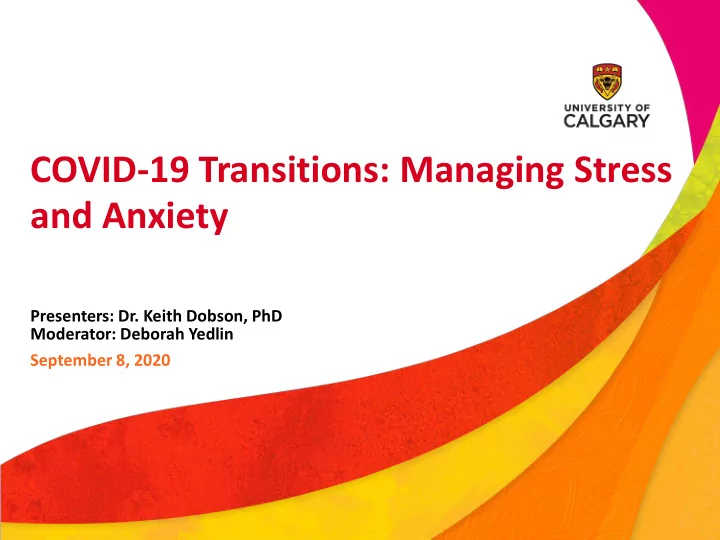

COVID-19 Transitions: Managing Stress and Anxiety Presenters: Dr. Keith Dobson, PhD Moderator: Deborah Yedlin September 8, 2020
Welcome • Moderator: Deborah Yedlin • Submit questions through the Q&A feature; we’ll answer as many as possible • Available on-demand 2
Dr. Keith Dobson, PhD Professor of • clinical psychology who leads UCalgary’s Depressi on Research Laboratory. His research interests are in clinical psychology, cognitive behaviour therapy, depression and psychopathology. 3
Factors associated with increased stress and anxiety Unpredictability Uncontrollability Personal Importance Stress 4
Risk Factors for Mental I llness • Models of risk and resilience evolve over time. • Established factors exist in multiple domains: Biological Social Psychological
Biological Risks • Genetic risk • Familial transmission • Neural structures • Neurobiology (neurotransmission) • Sleep dysregulation • Autonomic Nervous System arousal • Gender
Psychological Risks • Schemas, beliefs, assumptions • I nformation processing biases • Pessimism • Negative explanatory style • Rumination • Avoidant problem-solving • Avoidant/ escape behaviors
Social Risks • Parental psychopathology/ parenting style • Adverse Childhood Experiences (ACEs) • Attachment • Negative life events (e.g. loss, unemployment, illness) • Couple and relationship issues • Low levels of social support • Stress generation
Protective factors for mental health; Building resiliency 1. Balanced and recuperative temperament. 2. Physical well-being/ regular sleep. 3. Coping strategies. 4. Social and personal competence. 5. Positive peer relationships. 6. Positive family relationships.
What Can We do in Canada? • Increased surveillance and assessment • Ongoing self assessment • Reduce risks and increase resilience • Ask friends and family • Check in with GP or EAP service
What Can We do in Canada?
What Can We do in Canada? • Maintain routines as much as possible (eat, sleep, work) • Exercise • Get outside • Watch your self- talk; note especially worry or rumination • Turn down the media noise • Schedule activities: • Set specific short and long-term goals in the areas of productivity and enjoyment, every day.
What Can We do in Canada? • Keep social contact, even when physically distant • Practice acceptance and gratitude • Do something for others if at all possible: “ find a cause” • If in doubt, check it out. • Public Health Agency of Canada • Health Canada • Provincial Ministries of Health • World Health Organization
Treatments That Work Validated treatments should be the first approach, but no one treatment is “the best” Most validated treatments have about equal outcomes Combining treatments might improve outcomes, especially for more severe cases of mental health problems If one treatment does not work, another may Earlier treatment is associated with better outcome Conduct risk assessments when indicated Go to https://www.nice.org.uk for guidelines
What Can We do in Canada? • Lots of validated online resources, many free. • Ensure health information and resources are from a reputable organization or provider. • If necessary, get professional help.
What Can We do at the University of Calgary? The University of Calgary has a robust and well- developed Mental Health Strategy: https://www.ucalgary.ca/mentalhealth Guiding principles: Caring- actively supporting and promoting the mental health, well-being, and success of the campus community. We are an inclusive community promoting education, understanding, and awareness. Collaborative- We leverage and contribute to local, national, and international evidence and perspectives to strengthen our collective capacity to support mental health. Resilient- building capacity to strengthen ourselves; to inspire further growth and innovation in promoting and supporting mental health. Responsive- responsive to the mental health needs of the campus community. Continuously Improving- committed to a culture of continuous improvement in the domain of mental health
What Can We do at the University of Calgary? • Student Wellness Services: Access mental health support during campus closures by calling 403-210-9355. • Learn new coping skills and strategies at your own pace with online wellness workshops and learning • For 24/7 mental health support, call Distress Centre at 403- 266-4357 or Wood’s Homes Community Support team at 403- 299-9699 • Concerned about another student? E-mail the Student at Risk team at sar@ucalgary.ca • The Taylor Institute is offering resources and training to promote learning and well-bring delivery during COVID- 19
What Can We do at the University of Calgary? • Staff Wellness: A mental health consultant is available 8 a.m. to 4 p.m. by phone or email - 403-220-2918. • For 24/7 mental health support, call: Distress Centre- 403-266-4357 or Wood’s Homes Community Support- 403-299-9699 • Homewood Health provides 24/7 mental health support; call 1-800-663-1142 • The Taylor Institute is offering resources and training in course delivery during COVID- 19
UCALGARY Mental Health Resources • Student Wellness Services • Starting this fall is single session counselling, a 90-minute appointment providing access to the help students need when they need it. To access call 403-210-9355. • Staff Wellness • New workshop, Building Resilience Through Connection, will help attendees identify healthy coping strategies, like social supports, in response to stressors • UFlourish • Build positive mental health, resiliency and community connection at UCalgary through a month of online and in- person workshops, seminars, and events. October 13 – November 13. 19
Some Community Resources Health Link Alberta - Health information and advice. 811 or 866.408.5465. Mental Health Help Line - Free, 24/7 telephone service which offers help for mental health concerns for Albertans. 1.877.303.2642 (toll free within Alberta). Calgary Distress Centre - Free confidential crisis intervention, professional counselling and referral services to help you prevent and overcome crisis. 403.266.4357 Addiction HelpLine - Information, support, crisis counselling and referrals. 1.866.332.2322 First Nations and Inuit Hope for Wellness Help Line - 24/7 crisis intervention and counselling. 1.855.242.3310 YWCA: Domestic Violence Crisis Line - Information, referrals and services 403.266.0707 20
Recommend
More recommend